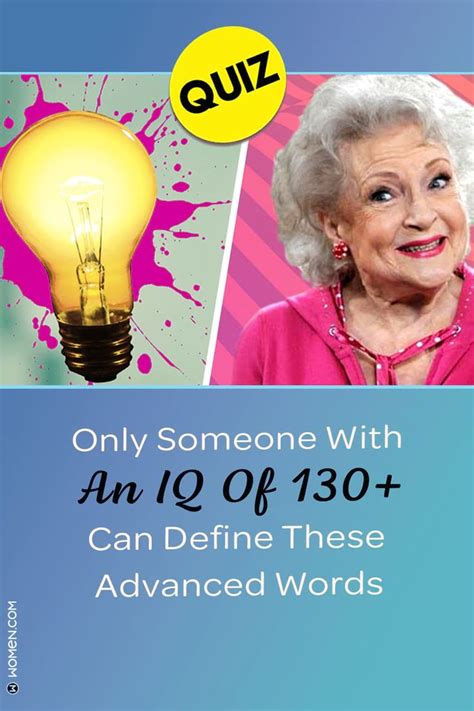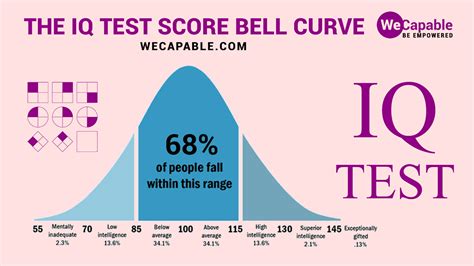
Only individuals with a high intelligence quotient (IQ) are likely to know the definitions of 34 challenging words, according to a vocabulary quiz circulating online. The test, featured on various platforms, challenges participants to define terms such as “peruse,” “ubiquitous,” and “plethora,” offering a glimpse into the breadth of one’s linguistic capabilities and potentially serving as an informal gauge of intellectual prowess.
A robust vocabulary has long been associated with intelligence, academic achievement, and professional success. While not a substitute for standardized IQ tests, vocabulary quizzes offer an engaging way to assess and expand one’s understanding of the English language. This particular quiz, highlighted by Yahoo Lifestyle, presents a diverse range of words designed to challenge even seasoned wordsmiths.
The words included in the quiz span various domains, from common yet often misused terms to more obscure vocabulary drawn from literature, science, and history. Some examples include “travesty,” “ephemeral,” and “capricious.” The ability to accurately define these words reflects not only a broad vocabulary but also a deeper understanding of nuances in meaning and context.
Many experts agree that vocabulary development is a lifelong pursuit. Reading extensively, engaging in thoughtful conversations, and actively seeking out new words are all effective strategies for expanding one’s lexicon. Online resources, such as dictionaries, thesauruses, and vocabulary-building apps, can also be valuable tools.
The popularity of vocabulary quizzes like this underscores the ongoing interest in self-assessment and intellectual curiosity. Whether taken for entertainment or as a serious measure of linguistic ability, these quizzes provide a valuable opportunity to engage with the English language and potentially discover new words to add to one’s repertoire. This heightened awareness of vocabulary can lead to improved communication skills, enhanced comprehension, and a greater appreciation for the power of language. The quiz serves as a reminder that continuous learning and vocabulary enrichment can contribute significantly to intellectual growth and personal development.
The Challenging Vocabulary List
The quiz, as highlighted by Yahoo Lifestyle, presents a selection of 34 words purported to be difficult for those with average or below-average IQs. The words represent a mix of relatively common terms that are often misused and more obscure words that require a deeper understanding of the English language. These are words that are not typically encountered in everyday conversation, but rather in more formal or academic settings. Mastering these words indicates a commitment to continuous learning and intellectual growth, further emphasizing the correlation between a rich vocabulary and higher cognitive abilities. Here is a closer look at some of the words included in the quiz:
- Peruse: To read or examine something carefully or at length. Often misused to mean “glance at” or “skim.”
- Ubiquitous: Present, appearing, or found everywhere. A common word in academic writing and discussions of social trends.
- Plethora: A large or excessive amount of something. Indicates abundance and is frequently used in both formal and informal contexts.
- Travesty: A false, absurd, or distorted representation of something. Implies a serious misrepresentation or mockery of something important.
- Ephemeral: Lasting for a very short time. Often used to describe fleeting moments or transient experiences.
- Capricious: Given to sudden and unaccountable changes of mood or behavior. Suggests impulsiveness and unpredictability.
- Esoteric: Intended for or likely to be understood by only a small number of people with a specialized knowledge or interest. Often used in academic or specialized contexts.
- Incipient: Beginning to happen or develop. Indicates the early stages of a process or phenomenon.
- Gregarious: Fond of company; sociable. Describes someone who enjoys being around others and is outgoing.
- Zenith: The time at which something is most powerful or successful. The highest point.
- Lugubrious: Looking or sounding sad and dismal.
- Fatuous: Silly and pointless.
- Ostensible: Stated or appearing to be true, but not necessarily so.
- Convivial: Friendly, lively, and enjoyable.
- Mellifluous: (of a voice or words) sweet or musical; pleasant to hear.
- Pulchritude: Beauty.
- Redolent: Strongly reminiscent or suggestive of (something).
- Penultimate: Second to last.
- Petrichor: A pleasant smell that frequently accompanies the first rain after a long period of warm, dry weather.
- Equanimity: Mental calmness, composure, and evenness of temper, especially in a difficult situation.
- Insouciant: Showing a casual lack of concern; indifferent.
- Perspicacious: Having a ready insight into and understanding of things.
- Sesquipedalian: Characterized by long words; long-winded.
- Obfuscate: Render obscure, unclear, or unintelligible.
- Lachrymose: Tearful or given to weeping.
- Defenestrate: Throw (someone or something) out of a window.
- Sycophant: A person who tries to win favor from wealthy or influential people by flattering them.
- Tendentious: Expressing or intending to promote a particular cause or point of view, especially a controversial one.
- Anachronism: A thing belonging or appropriate to a period other than that in which it exists, especially a thing that is conspicuously old-fashioned.
- Pusillanimous: Showing a lack of courage or determination; timid.
- Imbroglio: An extremely confused, complicated, or embarrassing situation.
- Quixotic: Exceedingly idealistic; unrealistic and impractical.
- Bildungsroman: A novel dealing with one person’s formative years or spiritual education.
- Logorrhea: Excessive talkativeness.
This list highlights the diversity of vocabulary expected of individuals with a high IQ. The quiz aims to assess not just rote memorization of definitions but also the ability to understand and apply these words in various contexts.
The Link Between Vocabulary and Intelligence
The connection between vocabulary and intelligence has been extensively studied in the fields of psychology and education. Research consistently demonstrates a strong positive correlation between vocabulary size and IQ scores. This relationship is not merely correlational; a rich vocabulary is often seen as a marker of cognitive ability and a predictor of academic and professional success.
One explanation for this correlation is that vocabulary acquisition is a cumulative process. Individuals with higher cognitive abilities tend to be more adept at learning and retaining new words through reading, conversation, and formal education. This creates a positive feedback loop, where a larger vocabulary facilitates further learning and intellectual growth.
Furthermore, vocabulary knowledge reflects a broader range of cognitive skills, including verbal reasoning, comprehension, and abstract thinking. The ability to understand and use a wide range of words indicates a capacity for nuanced thought and effective communication. In professional settings, individuals with strong vocabularies are often perceived as more intelligent, articulate, and capable.
However, it is important to note that vocabulary is not the sole determinant of intelligence. IQ tests typically assess a variety of cognitive abilities, including spatial reasoning, problem-solving, and memory. Vocabulary is just one component of a multifaceted construct.
Nonetheless, the importance of vocabulary cannot be overstated. A robust vocabulary empowers individuals to express themselves more effectively, comprehend complex ideas, and engage in meaningful discussions. It also provides a foundation for lifelong learning and intellectual growth.
Strategies for Vocabulary Enrichment
Expanding one’s vocabulary is a lifelong endeavor that can be pursued through various strategies. Here are some effective methods for vocabulary enrichment:
-
Extensive Reading: Reading is one of the most effective ways to acquire new vocabulary. By encountering words in different contexts, readers can develop a deeper understanding of their meanings and usage. Reading a variety of materials, including novels, newspapers, magazines, and academic texts, can expose individuals to a wide range of vocabulary.
-
Active Vocabulary Learning: Simply reading is not enough. Active vocabulary learning involves consciously identifying and studying new words. This can be done by keeping a vocabulary journal, creating flashcards, or using vocabulary-building apps. When encountering an unfamiliar word, it is helpful to look up its definition, pronunciation, and etymology.
-
Contextual Clues: Learning to infer the meaning of words from context is a valuable skill. When encountering an unfamiliar word, try to understand its meaning based on the surrounding sentences and paragraphs. Pay attention to synonyms, antonyms, and other clues that can provide hints about the word’s meaning.
-
Use of Dictionaries and Thesauruses: Dictionaries and thesauruses are essential tools for vocabulary development. Dictionaries provide definitions, pronunciations, and etymologies of words, while thesauruses offer synonyms and antonyms. Using these resources can help individuals understand the nuances of meaning and choose the most appropriate word for a given context.
-
Vocabulary-Building Apps and Websites: Numerous apps and websites offer vocabulary-building exercises, quizzes, and games. These resources can make vocabulary learning more engaging and interactive. Some popular options include Memrise, Quizlet, and Vocabulary.com.
-
Engaging in Conversations: Participating in conversations with knowledgeable and articulate individuals can expose one to new vocabulary and improve communication skills. Listening carefully to how others use words and asking for clarification when necessary can be a valuable learning experience.
-
Word Roots, Prefixes, and Suffixes: Understanding the roots, prefixes, and suffixes of words can help one decipher the meanings of unfamiliar terms. For example, the prefix “pre-” means “before,” so “precede” means “to come before.” Learning common roots, prefixes, and suffixes can significantly expand one’s vocabulary.
-
Writing Regularly: Writing is an excellent way to reinforce vocabulary learning. By actively using new words in writing, individuals can solidify their understanding of their meanings and usage. Writing also encourages one to think critically about word choice and to express ideas more precisely.
-
Playing Word Games: Word games, such as crossword puzzles, Scrabble, and Boggle, can be a fun and engaging way to expand one’s vocabulary. These games challenge individuals to think creatively about words and to recall their meanings and spellings.
-
Continuous Learning: Vocabulary development is a lifelong process. By making a conscious effort to learn new words and to use them in everyday communication, individuals can continuously expand their lexicon and enhance their cognitive abilities.
The Role of Formal Education
Formal education plays a crucial role in vocabulary development. Schools and universities provide structured learning environments that expose students to a wide range of vocabulary. Curricula in subjects such as literature, history, and science introduce students to specialized vocabulary that is essential for understanding these disciplines.
Teachers and professors often emphasize the importance of vocabulary development and provide students with strategies for learning new words. They may also assign vocabulary quizzes and tests to assess students’ understanding of key terms.
Furthermore, formal education provides opportunities for students to engage in discussions and debates, which can enhance their communication skills and vocabulary. By interacting with peers and instructors, students can learn new words and practice using them in various contexts.
However, formal education is not the only avenue for vocabulary development. Individuals can also learn new words through independent study, online resources, and informal learning experiences. The key is to be proactive and to make a conscious effort to expand one’s lexicon.
Criticisms and Limitations of Vocabulary Quizzes
While vocabulary quizzes can be a useful tool for self-assessment and vocabulary enrichment, it is important to acknowledge their limitations. Vocabulary quizzes are not a substitute for standardized IQ tests and should not be used as the sole measure of intelligence.
One limitation of vocabulary quizzes is that they typically assess only a narrow range of vocabulary. The words included in a quiz may not be representative of the entire English lexicon. Furthermore, vocabulary quizzes often focus on formal or academic vocabulary, which may not be relevant to everyday communication.
Another limitation is that vocabulary quizzes can be influenced by factors other than intelligence. For example, individuals with higher levels of education or exposure to certain types of media may perform better on vocabulary quizzes, regardless of their underlying cognitive abilities. Cultural background and language exposure can also play a role.
Moreover, vocabulary quizzes can be subject to biases. The words included in a quiz may be more familiar to certain demographic groups than others. This can lead to inaccurate assessments of vocabulary knowledge and intelligence.
Despite these limitations, vocabulary quizzes can still be a valuable tool for self-assessment and vocabulary enrichment. By taking vocabulary quizzes, individuals can identify areas where they need to improve their vocabulary and develop strategies for learning new words. However, it is important to interpret the results of vocabulary quizzes with caution and to consider them in conjunction with other measures of intelligence and cognitive ability.
The Enduring Appeal of Language
The enduring popularity of vocabulary quizzes and other language-related activities underscores the inherent human fascination with language. Language is not merely a tool for communication; it is also a source of creativity, expression, and intellectual stimulation.
The ability to understand and use language effectively is a fundamental aspect of human intelligence. It allows us to express our thoughts and feelings, to communicate with others, and to make sense of the world around us.
Furthermore, language is constantly evolving. New words and phrases are continually being created and adopted, reflecting changes in society, culture, and technology. The study of language provides insights into the history and evolution of human thought and culture.
Whether one is a seasoned wordsmith or a novice language learner, there is always something new to discover about the English language. Vocabulary quizzes and other language-related activities provide a fun and engaging way to explore the richness and complexity of language.
Conclusion
The “IQ Test: Can You Define These 34 Tricky Words?” highlights the intrinsic link between vocabulary and intelligence. While not a definitive measure of IQ, a strong vocabulary is indicative of cognitive ability, learning capacity, and communication skills. By continuously expanding their vocabulary through reading, active learning, and engagement with language, individuals can enhance their intellectual growth and improve their overall communication abilities. The quiz serves as a reminder of the importance of continuous learning and the enduring power of language in shaping our understanding of the world. While vocabulary tests have limitations, the enduring appeal shows that people are interested in expanding their knowledge.
Frequently Asked Questions (FAQs)
-
Is this vocabulary quiz a substitute for a real IQ test?
No, this vocabulary quiz is not a substitute for a standardized IQ test. While a strong vocabulary often correlates with higher intelligence, IQ tests assess a broader range of cognitive abilities, including spatial reasoning, problem-solving, and memory. Vocabulary knowledge is just one component of a multifaceted assessment. As stated in the article, “While not a substitute for standardized IQ tests, vocabulary quizzes offer an engaging way to assess and expand one’s understanding of the English language.”
-
How does vocabulary size relate to intelligence?
Research consistently shows a strong positive correlation between vocabulary size and IQ scores. “This relationship is not merely correlational; a rich vocabulary is often seen as a marker of cognitive ability and a predictor of academic and professional success.” A larger vocabulary reflects cognitive skills such as verbal reasoning, comprehension, and abstract thinking.
-
What are some effective strategies for expanding my vocabulary?
Effective strategies include extensive reading, active vocabulary learning (using flashcards or vocabulary journals), inferring meaning from context, utilizing dictionaries and thesauruses, using vocabulary-building apps, engaging in conversations, learning word roots and prefixes, writing regularly, and playing word games. The article suggests, “Reading extensively, engaging in thoughtful conversations, and actively seeking out new words are all effective strategies for expanding one’s lexicon.”
-
Are there any limitations to using vocabulary quizzes as an assessment tool?
Yes, vocabulary quizzes have limitations. They assess a narrow range of vocabulary, may be influenced by education level and cultural background, and can be subject to biases. They should not be used as the sole measure of intelligence. According to the article, “One limitation of vocabulary quizzes is that they typically assess only a narrow range of vocabulary. The words included in a quiz may not be representative of the entire English lexicon.”
-
Why is having a large vocabulary important?
A robust vocabulary empowers individuals to express themselves more effectively, comprehend complex ideas, engage in meaningful discussions, and enhances communication skills. It also provides a foundation for lifelong learning and intellectual growth and success in school and a career. “A robust vocabulary empowers individuals to express themselves more effectively, comprehend complex ideas, and engage in meaningful discussions.”









